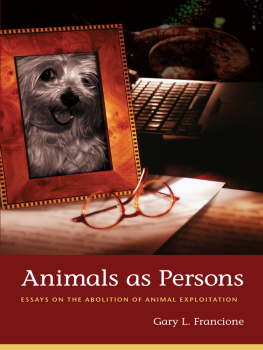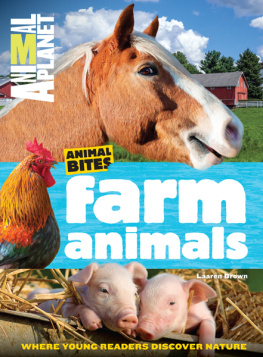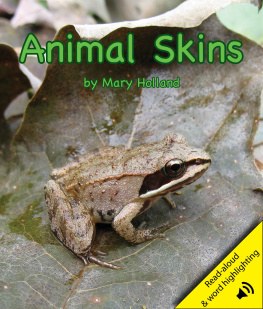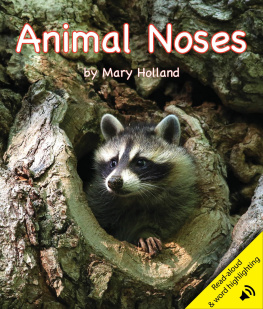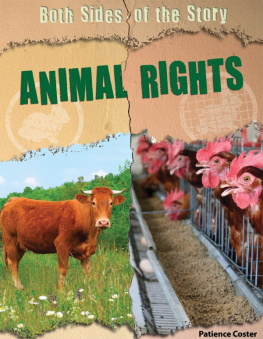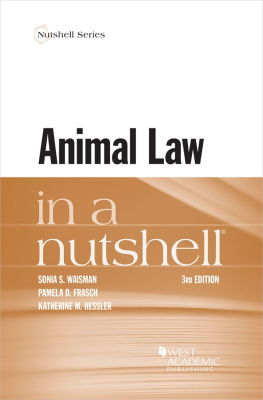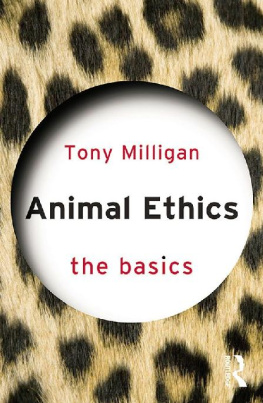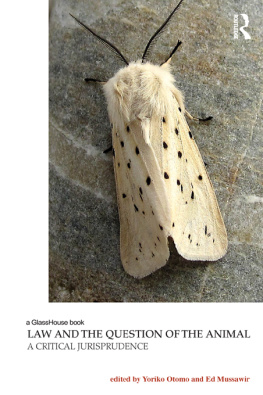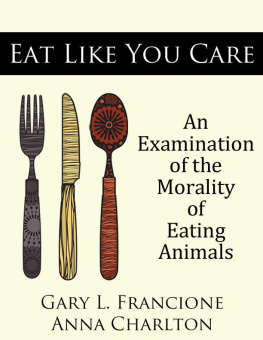ANIMALS AS PERSONS
Columbia University Press
Publishers Since 1893
New York Chichester, West Sussex
cup.columbia.edu
Copyright 2008 Gary L. Francione
All rights reserved
E-ISBN 978-0-231-51156-8
Library of Congress Cataloging-in-Publication Data
Francione, Gary L. (Gary Lawrence), 1954
Animals as persons : essays on the abolition of animal exploitation / Gary L. Francione.
p. cm.
Includes bibliographical references and index.
ISBN 978-0-231-13950-2 (cloth : alk. paper) ISBN 978-0-231-13951-9 (pbk. : alk. paper)
ISBN 978-0-231-51156-8 (ebook)
1. Animal rights. 2. Animal welfareLaw and legislation. 3. AnimalsLaw and legislation. I. Title.
K3620.F73 2008
344.049dc22
2007053043
A Columbia University Press E-book.
CUP would be pleased to hear about your reading experience with this e-book at .
References to Internet Web sites (URLs) were accurate at the time of writing.
Neither the author nor Columbia University Press is responsible for URLs that may have expired or changed since the manuscript was prepared.
To the two hamsters and twelve dogs who taught me the meaning of personhood
Paradigm shifts in human thought always depend on iconoclasts who are not afraid to challenge conventional wisdom. Although our thinking in the past generation about the moral status of animals has advanced in certain respects, its fundamental presuppositions have suffered from a debilitating stagnation. In contemporary thought no individual has been doing more to challenge these presuppositions in a fruitful way than Gary Francione.
The past generation of thinking about animals has been dominated by the thought of Peter Singer and Tom Regan. Indeed, Singers and Regans work on animals has been so influential that few thinkers have been willing to question their basic assumptions. Singer takes a utilitarian approach derived from Bentham and Mill, while Regan takes a deontological approach inherited from Kant. Both seek to refine and improve the views of their historical forebears, and both have done a great deal to draw attention to the plight of animals. But as Francione has shown through his meticulous and critical examination of their work, neither Singer nor Regan has succeeded in overcoming the anthropocentric limitations of traditional Western philosophical thinking about the moral status of animals. Nonetheless, Francione has succeeded in rethinking the tenets of utilitarianism and deontology so as to develop an entirely new approach that identifies sentience as the necessary and sufficient condition for the possession of rights. Specifically, he argues that all sentient beings, those capable of experiencing pleasure and pain, have a fundamental interest in avoiding suffering and continuing to exist. We protect (at least in theory) the right of all humans not to have to suffer the deprivation of their fundamental interests by being used as the resources of others. In other words, all humans have the right not to be treated as the property of others. Francione contends that there is no reason not to accord this right to nonhuman animals as well. Once we recognize this right, we must abolish our institutionalized exploitation of animals, which rests on their status as economic commodities.
Francione has argued for this conclusion at length in numerous essays and in his books, Animals, Property, and the Law (1995) and Introduction to Animal Rights: Your Child or the Dog? (2000). Central to Franciones critique of Singer and Regan is his rejection of similar-minds theory, the view that animals must be cognitively like human beings in order to possess inherent moral worth (see Taking Sentience Seriously in this volume). The dominant assumption in the history of Western philosophy has been that only those beings capable of reason and language can have full moral worth. Thus animals would have to be rational and linguistic in the same sense as humans in order to merit moral respect and to have the right not to be mere resources. Like Bentham and Mill before him, Singer proceeds from the idea that sentience is the only capacity relevant to considerations of moral worth, and concludes that human beings enjoy certain moral prerogatives over animals on the ground that our superior cognitive capacities make it possible for the future to matter to us in ways that it cannot matter to animals. Humans, like nonhumans, have an interest in how they are treated, but unlike animals, humans also have an interest in life per se. Thus Singer ultimately reinforces an anthropocentric hierarchy that subordinates animals to the interests of human beings and accordingly focuses on the treatment, not the use, of animals. Similarly, Regan argues that animals (at least mammals over one year of age and perhaps other animals as well) have inherent moral worth equal to that of humans but concludes that in unavoidable conflicts of interest between humans and animals, the interest of humans should prevail because our superior cognitive abilities give us greater opportunities for future satisfaction than animals can have. Francione challenges the basic assumptions behind these conclusions and rejects the idea that the inherent worth of human beings is any greater than that of animals (see Comparable Harm and Equal Inherent Value: The Problem of the Dog in the Lifeboat in this volume).
The crux of Franciones challenge to Singer and Regan is the proposition that any being that is sentient necessarily has an interest in life because sentience is a means to the end of continued existence, an idea expressed in a number of essays in this book. Once we acknowledge that a being has an interest in life, we must recognize that this being also has a right to life and the avoidance of suffering that is equal in principle to the right to life enjoyed by any other sentient being. We may not make quantitative or qualitative distinctions among sentient beings in regard to their right to life. If a being has a right to life, then that being also has a right not to be property. This right is basic in the sense that it gives rise to important subsidiary rights, such as the right not to be killed for food, experimented upon, or used for entertainment. As Francione argues in the essays in this volume, these rights are shared equally by human and nonhuman animals; they have a categorical force that forbids us to subordinate the interests and fortunes of animals to those of humans.
A related aspect of Franciones iconoclasm is his absolute rejection of animal welfarism. In Rain Without Thunder: The Ideology of the Animal Rights Movement (1996) and in Reflections on Animals, Property, and the Law and Rain Without Thunder in this volume, Francione distinguishes between animal welfarism and abolitionism. Welfarists take the view that using animals to satisfy human desires is acceptable, and they emphasize the need to treat animals well in the process of using them. Welfarists often argue that killing and eating animals is permissible as long as we raise them in comfortable and healthy circumstances. For example, we are entitled to kill and eat chickens as long as they are allowed free-range living conditions. Abolitionists, on the other hand, see any such uses of animals as a fundamental violation of their right not to be property, and they argue that all uses of animals to satisfy human desires must cease altogether. Francione argues that we have no moral justification for continuing to bring domestic animals into existence for human use. One focal point of his work has been his effort to demonstrate that there are now more animal welfare regulations in place than ever before, and yet there is more exploitation inflicted on more animals today than ever before. In effect, animal welfare regulation simply permits human beings to feel better about exploiting animals.
Recognizing that abolition will not occur immediately, Francione focuses on the incremental eradication of the status of animals as property and on the importance of veganism, the complete rejection of the use of animals for food or other purposes. As he describes it, veganism is the application of the principle of abolition to the life of the individual. For Francione, perhaps more than any other contemporary figure since Donald Watson, who founded the Vegan Society in Britain in 1944, veganism must be the guiding conviction in all discussion of animal ethics.
Next page
